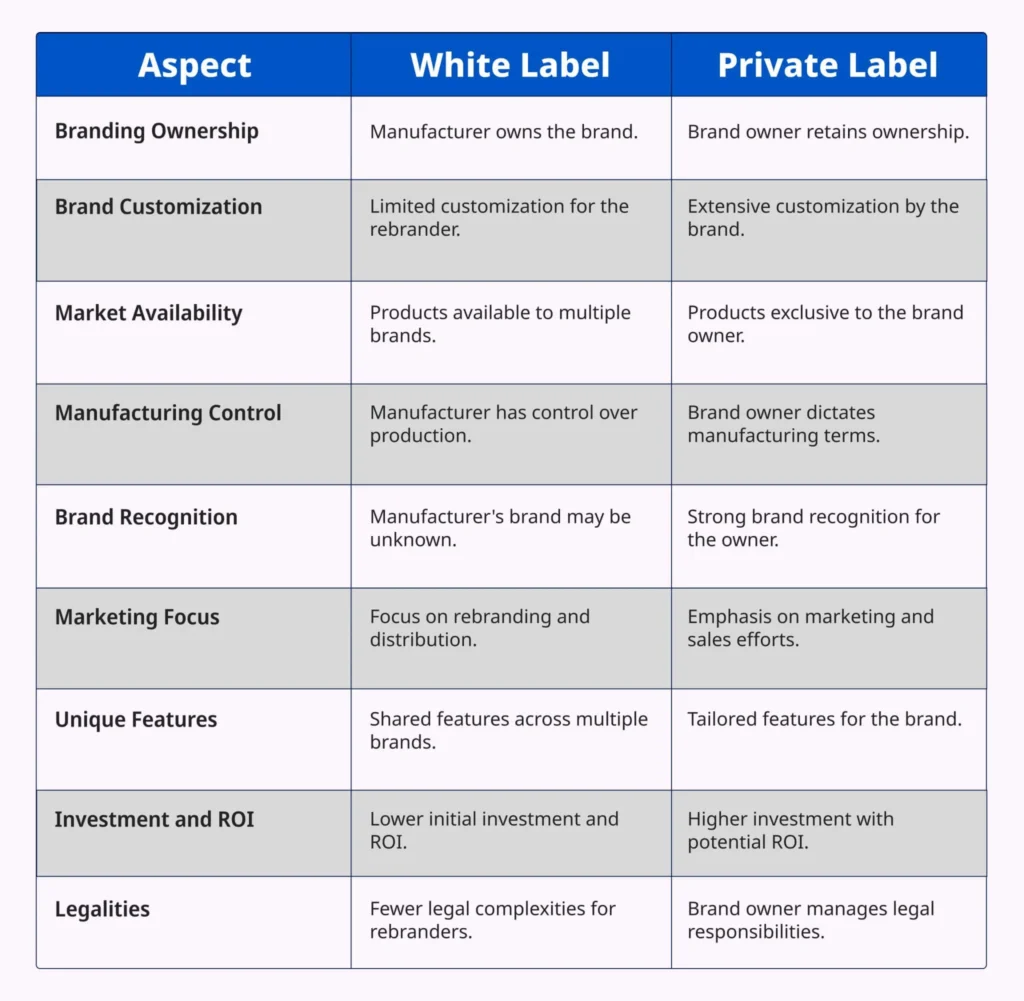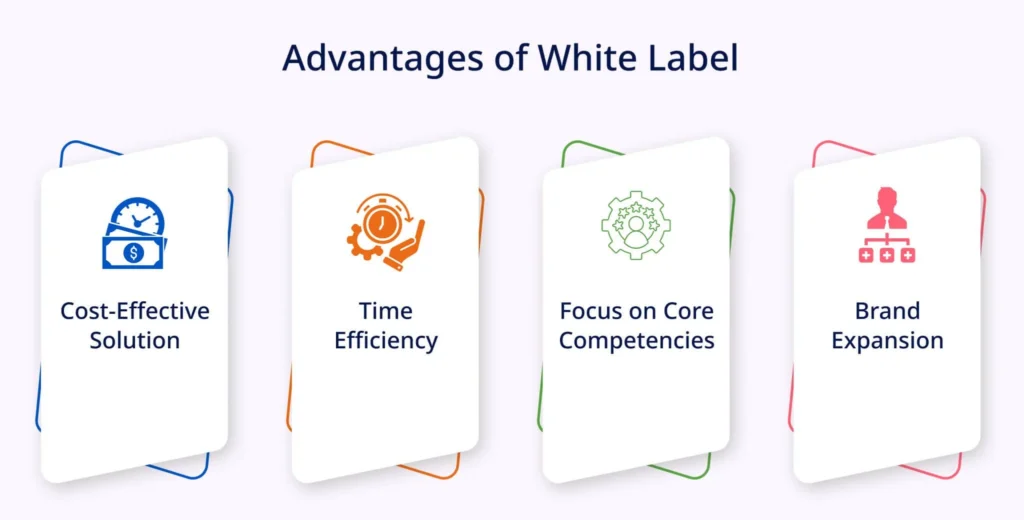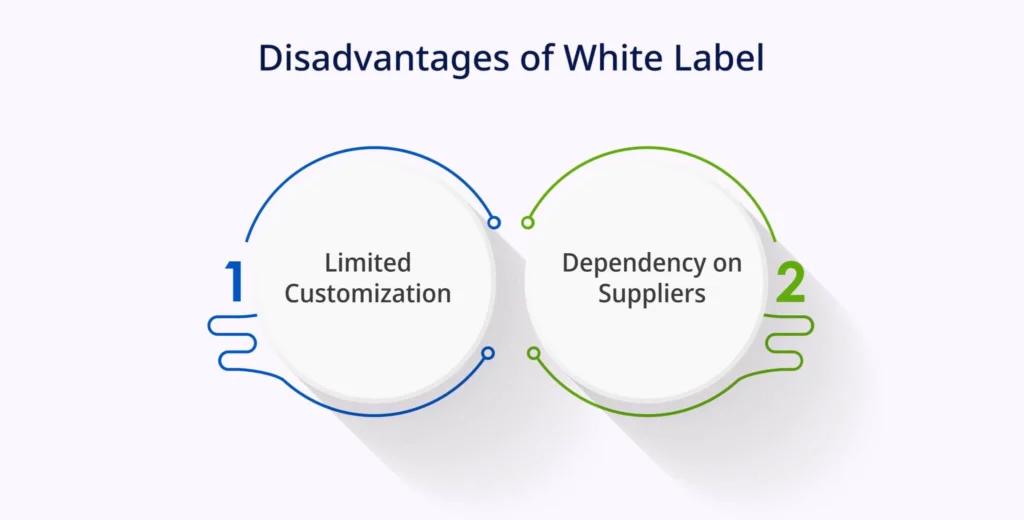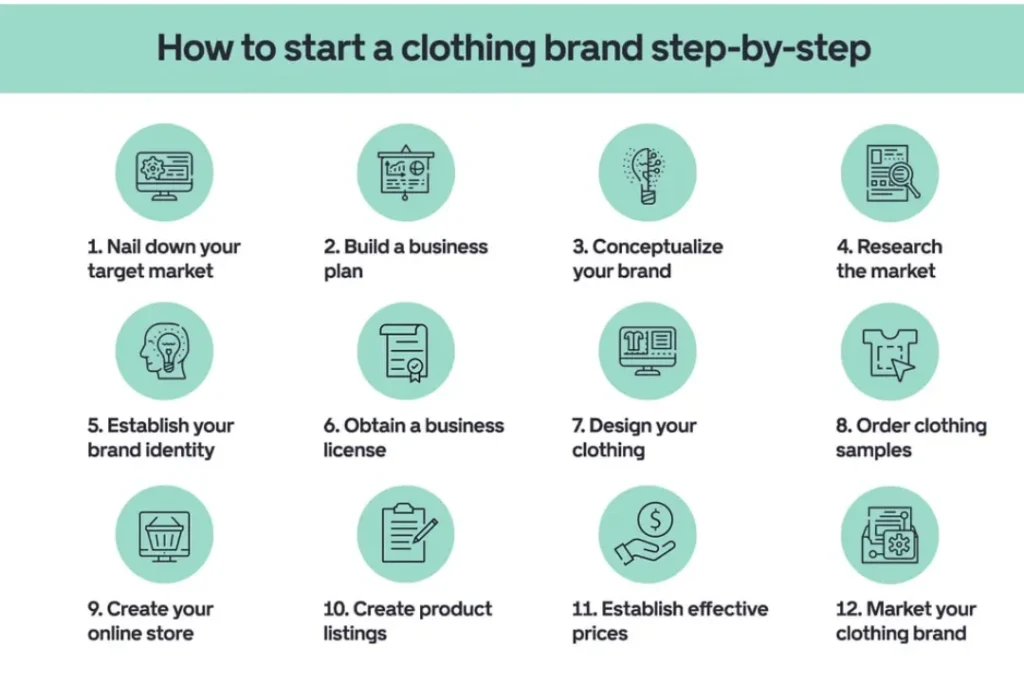
Why Clothing Brands Fail
Top Different Types of Shirts for Women and Men Top Different Types of Shirts for
A Canvas For Creativity And Branding To Promote Your Brand’s Style Through Customization And Identity
By one company for resale under another company’s label is a concept known as White Label Clothing in the fashion industry. Put simply, it is pre-made clothing made by one person and sold under a different name. This enables companies to provide an array of clothes without requiring huge internal production capabilities. Thus, companies are able to use existing designs while morphing them into their own so that they can represent themselves and reach out to their people. In response to ever-changing market needs and trends, White Label Clothing lets brands broaden their lines at a lower cost and higher speed hence providing companies with flexible adjustment options.
By fashion retailers, e-commerce brands, and designers looking for diversity or other options within their collection this work has been adapted widely. Therefore, businesses utilize White Label Clothing as convenient means of enhancing their product portfolios, responding to consumers’ preferences, and obtaining unique corporate identities in rapidly changing fashion environment. In this comprehensive blog, we will find out what is white label clothing? And how it is a exclusive branding and customization opportunity for retailers.
White Label Clothing, as the name suggests, are unbranded garments that are not attributed to any particular designer or brand at all. These clothes are made by companies that then lend them out for other businesses to rebrand and sell them under their own label name. White label clothing allows retailers an assortment of garments without requiring their own design or production resource, which is an inexpensive way to widen one’s range of merchandise.

Clothes that bear no labels of any kind and are made by manufacturers for sale by other businesses are known as White Label Clothing. Since these items do not carry a certain designer’s name or a brand, they enable wholesalers to provide several types without spending much money on designs or production. It is therefore an economical means of expanding product lines and serving various customers through its different market segments.
Although White Label Clothing is generically branded and can be rebranded by different companies for sale, on the other hand, Private Label Clothing comes with a specific brand name of particular retail store or company. While Private Label Clothing entails creating one-off designs typically in conjunction with a retailer to match their target buyer and brand image; in comparison, White Label Clothing is pre-made and unlabeled clothes meant for firms desiring to have additional items in stock but without drawing much from designers.

White labeling is a strategy employed by businesses that enables them to provide numerous product options without acquiring excessive expenses that normally accompany in-house design and manufacturing. The use of pre-made white label products allows the firms to reduce their production costs and reallocate finances to other areas of their operations.
White Label products enable companies to quickly enter new markets or expand their product ranges without engaging in lengthy designing and producing timeframes. Bringing these products to market quickly can help them tap into the emerging trends and seasonal demands.
The use of white label products allows companies to focus on brand development and promotion through efficient marketing techniques. By outsourcing the production and design part to White Label suppliers, firms can use more manpower in building the recognition of their names, creating advertisements, getting involved with target audience.

Scalability is the hallmark of white labeling as businesses can easily modify their products to reflect customer inclinations, present-day vogue or seasonal variations. This way, the enterprises working with white label producers are able to react to market fluctuations and change the volume of their operations.
Retailers often choose White Label Clothing so they can diversify their product range without having to design and produce them in-house. By rebranding White Label clothes, retailers can increase their stocks and be able to meet customer likings.
White Label Clothing is an excellent way for fashion labels to launch new patterns or prototypes around with creative ideas and designs without gaining high production costs. Fashion brands can take advantage of White Label articles to examine current market tendencies as well as customer preferences on a quick basis.
Web-based markets may include White Label Clothing in their product lists offering customers different kinds of garments. By means of e-commerce, such as Word Press, online stores are able to sell a wide range of cloth styles and sizes at the same time for diverse customer preferences.
Frequently, boutique stores utilize White Label Clothing to create personalized and unique lines that suit their brands’ way of doing things. This is achieved by choosing White Label clothing styles that appeal to the targeted audience for these small producers allowing them to expand their product range while maintaining an ineradicable presence in the market.
The advantage of lower manufacturing cost against the designing of custom made garments is given to businesses by White Label Clothing. By making use of already existing clothing items, a company can save on costs related to design as well as production and material costs. This makes it possible for companies to widen their product range without putting a lot into manufacturing facilities.

The advantage of lower manufacturing cost against the designing of custom made garments is given to businesses by White Label Clothing. By making use of already existing clothing items, a company can save on costs related to design as well as production and material costs. This makes it possible for companies to widen their product range without putting a lot into manufacturing facilities.
With the streamlined white labeling process, businesses can quickly roll out their products. This is possible because organizations can use some of their already existing designs and manufacturing systems as a way of responding timely to what consumers demand and what the market requires. Therefore, companies which provide white label garments can always be in a better position to beat a competitive edge since they are able to have seasonal offers whenever there is need for them.
For firms comparative to designing individual clothing series, the less danger posed by White Label Clothing is less. By presenting similar items that have been popular in the market before, these organizations can thus avoid any loss in their finances that arises from producing new products. Hence providing more room for companies to work on promoting their brands, developing marketing strategies and interacting with clients; all these give a better chance of succeeding in the marketplace.
A negative aspect of White Label Clothing is the restricted choices for customization open to businesses. With companies rebranding already existing pieces of clothing, they might encounter hurdles in making distinctive designs that would set them apart from opponents. The limitation on this aspect can meddle with brand identity and prevent some businesses from serving certain individuals’ needs.

In White Label Clothing, businesses depend on the quality and reliability of their suppliers. An inconsistency in the quality of White Label products received from suppliers can significantly affect a brand’s reputation. A business must ensure that it controls the standard of its suppliers so as to achieve customer satisfaction within its market as well as maintain its credibility for the respective brand.
With the streamlined white labeling process, businesses can quickly roll out their products. This is possible because organizations can use some of their already existing designs and manufacturing systems as a way of responding timely to what consumers demand and what the market requires. Therefore, companies which provide white label garments can always be in a better position to beat a competitive edge since they are able to have seasonal offers whenever there is need for them.
Amazon Essentials
E-commerce giant Amazon has established itself as a leading example of White Label clothing through its Amazon Essentials brand. The label has a large collection consisting of everyday wear from T-shirts to jeans and at leisure wear. To meet the needs of their clients in terms of low-cost essentials like clothing, Amazon depends on white label products.
Zara TRF
Zara TRF which is a premium label incorporated by the popular brand Zara has been developed to suit the taste of younger individuals with trendy and cheap clothing. This means that any garment worn by young adults but branded as Zara TRF fits within their budget. Such garments such as dresses, tops or skirts may go for less than $20 thus enabling one to have many outfits featuring similar styles at a cheaper price.
ASOS DESIGN
ASOS is a UK-based online fashion trader that has a white label clothing line recognized as ASOS DESIGN. This label includes various clothing items within several styles and categories, enabling ASOS to have customers from different backgrounds. By using white label products, ASOS can develop new designs on a regular basis and also adapt its products to the rapidly shifting trends in fashion.
H&M Basics
H&M, an international dress commodity supplier, carries a line of White Label Clothing branded H&M Basics which consists of must-have items like t-shirts, jeans, and casual apparel. Through the application of White Label items, H&M is able to offer low-priced yet superior baselines that can be accessed by anyone around the world therefore demonstrating the adaptability and effectiveness of using this kind of panel in a retail store.
So if you go for it, follow the steps outlined below and put in enough effort with each phase of launching a clothing brand that employs white labeling to create something compelling enough to appeal to your target customers, thus distinguishing yourself from others in the fashion industry.

Choose trustworthy suppliers who have an established history of delivering excellent goods and services. In order to guarantee that the quality of products is maintained, prospects for suppliers must be assessed against such factors as their capacity for production, period required for delivery, charges they impose on goods delivered, and arrangements for controlling the quality in that.
Carry out extensive market analysis to determine the target populations, market arrangements, and competitors. Grasp customers’ likings and market wants so that you become knowledgeable about how to choose goods and create a name for them.

Make a strong impression of your brand that explains the distinct worth you have for the customers. Design eye-catching and desirable branding elements like logos, packages, and product labels. Utilize both digital media and traditional methods to promote your company’s visibility as well as increase its sales volume.
Make certain to choose clothing items that suit your target market as well as the identity of your brand. Pick the designs that will connect with the clients and make your brand unique in the industry. You can work with your suppliers to create custom designs or buy already manufactured White Label products.

In anticipation of launching your own White Label Clothing business, create an e-commerce site or physical store. Make sure that your online store displays your items well and makes shopping easy for customers. To create excitement and attract customer interest during the launch, make use of Facebook ads, partnerships with social media personalities and public relations initiatives.

In order to manage properly a successful White Label Clothing enterprise, it is important to have clear knowledge about these initial investments, everlasting expenses and how they influence, indeed, the profit margins. Be sure to check your finances and make any necessary adjustments for economic expansion that lasts longer as well as its corresponding gains.
It could be necessary to make an initial investment in product selection, design, and customization of White Label clothing items. This could involve creating unique designs, color options, or fabric choices to differentiate your brand in the market.
In order to create relationships with trustworthy suppliers, there’s an upfront investment which includes supplier seeking, talks with potential providers and even minimal amounts of products they need to sell on first order. It is very important to invest in reliable and highly ranked suppliers so that quality of the products remains intact and timely delivery guarantees.
Creating things such as logos, labels, and packages is considered the branding expense as well as any marketing materials. In any competitive market, strong branding is crucial for attracting target customers and differentiating oneself from the rest.
When considering the sale of White Label attire through the Internet, first investments into the e-commerce site are unavoidable. It could entail design of a website, maintenance charges for the site, payment process mechanisms and other expenses that are associated with establishing an online shop.
When it comes to starting a White Label Clothing line, you must be financially prepared to sell your garments via advertising in order to sell them to the right customers. This might include putting aside money for advertising campaigns, hiring influencers, social media marketing, or other ways of promotion.
It is an ongoing expense regarding the manufacture or purchase of White Label clothing products from suppliers, so constant replenishment and introduction of new designs can be associated with them in terms of regular product order expenses.
Just so you know, your White Label Clothing brand will require constant marketing and advertising costs for promotions, customer engagement keeping and sales boosting. For example, these can include digital marketing campaigns, social media ads or any other promotional activities.
The costs associated with packaging include the materials utilized for product packaging and shipping. The entire brand experience is enhanced, and customer satisfaction rises when products are suitably and attractively packed.
Continued expenditures related to inventory management consist of storing products, knowing the status of the supplies, and fulfilling orders. Properly managing one’s inventories is the main way to satisfy customers who demand goods for their immediate satisfaction while also avoiding unnecessary allocations due to overstocking.
Allotting resources for customer support and service is essential to answer the questions customers ask, respond to their observations or comments as well as solve the problems that may arise. This ongoing spending on customer service leads to customer satisfaction with the brand eventually making it trustworthy.
A White Label Clothing company’s financial performance and stability greatly depend on profitability margins. These are some significant aspects that affect profit margins in the business model:
The margins of profits depend upon the prices obtained through negotiation from suppliers for White Label goods. Efficient management of expenses as well as competing pricing tactics influence bulk pricing which in turn directly affects the profits earned per item sold.
The markup percentage that is applied to wholesale product costs determines retail pricing and profit margins. Adjusting the competitive pricing vs. profit margin goals is very crucial in maximizing revenue while enticing customers.
Enhanced product sales volume results in the economies of scale that lower individual production expenses and hence increase profit margins. Moreover, repeat purchases, larger customer bases, and increased sales volumes, help to boost general profit.
Profit margin fluctuates by market demand, pricing strategies that competitors use on their products as well as preferences of the consumers themselves. Besides keeping up with the market trends always like carrying out periodic price analysis and adjusting the range of products to suit client requirements will earn a person competitive profit margins.
Operational efficiency in supply chain management, inventory control, and cost optimization influences an enterprise’s profitability. If a firm has better profit margins, it is likely that its processes are more refined while its overheads are lower and its inventory management practices are sounder as well.
So as to have a wider reach, establish customer engagement and enhance revenue opportunities amid competition in fashion industry, you must use e-commerce platforms; social media marketing; influencer collaborations and search engine optimization techniques in your marketing and selling efforts for white label clothing.
To establish your web shop and display your White Label clothing goods, make use of such online selling platforms as Shopify, Woo Commerce or Big Commerce. To increase how people shop for products, tailor the appearance of your store and improve its descriptions.
Use Instagram, Facebook, and Pinterest which are the most well-known social media sites to market your white label apparel brand. You can make interesting visuals, set up targeted advertisements, interact with your fans and work with influencers so that you gain visibility as a brand, attract customers to your online shop and sell more products.
By partnering with influencers and fashion bloggers in your niche, you can expose their audience to your White Label clothing products. The way credible influencers collaborate to promote brands can greatly extend their reach, make them more trustworthy and lead large sales through referrals.
Adopt approaches to search engine optimization (SEO) dealing with enhancing your site’s visibility and those of the white label clothing merchandise upon Google’s listings. Such includes optimizing product description, Meta title, and tag entry with coherent URLs, producing quality incoming links for enhancing visitors to your shop through natural accesses as well as ranking on searching engines.
In conclusion, what is white label clothing means clothes that are produced by one firm and renamed by another to be sold under a new brand name. With this business model companies do not require in-house production but can provide pre-made goods under their own label. The White Label Clothing allows firms to expand their product range, penetrate into new markets and improve brand identity without having to sustain the costs and time involved in product development. By collaborating with producers and modifying existing patterns, a company can come up with an exclusive clothing line targeting specific customer preferences. This idea is especially prevalent in the fashion sector where businesses use White Label solutions as a competitive strategy, collection diversification, and quick responses to change of market trends. Cost-wise, White Label Clothing is a great choice for brands wishing to broaden their product portfolio and enhance revenue sources while remaining flexible and innovative regarding branding strategies.
Have your target audience in mind, develop a captivating story for your brand, and use e-commerce platforms and digital marketing to reach moms and dads looking for quality baby wear.
The four categories of private labels are premium private labels, economy private labels, generic private labels as well as copycat or knock-off private labels.
Profitability ratios may differ between white and private label products depending on aspects like branding; marketing strategy among others. In fact, higher representations would be observed within the private label segment because of factors such as brand loyalty together with exclusivity.
Expert Custom Clothing Manufcaturer

Top Different Types of Shirts for Women and Men Top Different Types of Shirts for

What You Must Know About Clothing Samples? Before You Produce a Single Garment: What You

How Much Does It Cost To Make a Hoodie A Complete Cost Breakdown for Custom

Discover the Types of Buttons Discover the Types of Buttons That Transform Style and Functionality
Most Recent Posts
Expert Custom Clothing Manufcaturer
Join our Mailing list!
Get all latest news, exclusive deals and updates.